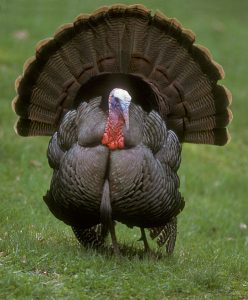 Maintaining the health of the turkey flock stems from good hygiene and sound management. Most small-scale turkey owners should experience little trouble provided they follow good husbandry procedures. The main points are as follows:
Maintaining the health of the turkey flock stems from good hygiene and sound management. Most small-scale turkey owners should experience little trouble provided they follow good husbandry procedures. The main points are as follows:
- Always buy healthy vaccinated stock from a known breeder.
- Quarantine new stock for a couple of weeks after arrival.
- Try to keep different ages and breeds separate.
- Provide clean, dry and well-ventilated housing.
- Maintain clean housing and dry floor litter.
- Provide good quality food such as pellets and grain regularly.
- Ensure there is fresh drinking water and insoluble grit at all times.
- Clean feeders and drinkers regularly.
- Feed turkeys where wild birds cannot gain access.
- Make sure that there are no rats in the vicinity.
- Check houses and birds regularly for the presence of mites and lice.
- Avoid overstocking and ensure that the housing has sufficient perch space and floor area for the number of birds.
- Ensure that any utilised grassland is free of poisonous plants and boggy areas and has not previously been used by other poultry or turkeys.
- Rotate pasture regularly.
- Study your turkeys and look out for any unusual behaviour.
What to look out for – symptoms of illness in turkeys
- Eye, nasal or vent discharge.
- Lack of coordination, limping or a hunched stance.
- Lethargy, with long periods of sitting or lying around.
- Lack of, or excessive, appetite or thirst.
- Thinness or general loss of condition.
Despite all precautions, problems can appear, although they are unlikely in a small-scale non-intensive turkey enterprise.
If any bird shows unusual symptoms, isolate it from the rest of the flock in a small pen just in case it is infectious. Provide food and water and keep an eye on it. If several birds are affected, call the vet without delay.
There are some diseases that are notifiable; the law requires that you seek veterinary help so that they can be reported. Bear in mind that some diseases can also affect humans (zoonoses) so always wash your hands after contact with the birds.
The Annual Moult
The annual moult is not a health condition but a normal manifestation where old feathers are dropped, to be replaced by new ones. However, it is a time when extra care is needed at a time when the bird is under stress and its resources are concentrated on growing new feathers.
It needs adequate feeding, so ensure that it is getting enough protein, as in a good quality proprietary feed. It is also a time to check that feather-pecking is not taking place, or in case external parasites have become established. The moult should not last more than around three weeks. If it does, there may be a problem with any of the above-mentioned.
This article is a shortened extract from Starting with Turkeys by Katie Thear and used with permission of the publisher.
Further Articles on Keeping Turkeys
- Breeding Turkeys – Genetics & Stock
- Breeding Turkeys – Incubating & Hatching Turkey Eggs
- Breeding Turkeys – Introducing Sexes & Mating Turkeys
- Breeding Turkeys – Turkey Rearing: Good Stock
- Guide to Keeping Turkeys – Housing & Feeding Turkeys
- Guide to Keeping Turkeys – Introduction & Turkey Breeds
- Guide to Keeping Turkeys – Turkey Diseases
- Guide to Keeping Turkeys – Turkey Health
- Guide to Keeping Turkeys – Turkey Parasites & Poison

